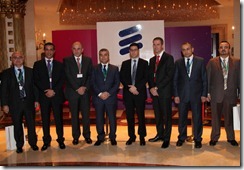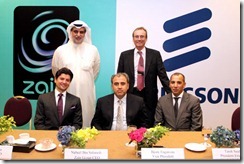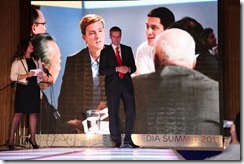The Ericsson Media Summit held in Beirut at the end of November brought together telecom professionals and students from around the Middle East region for a discussion of the ICT drivers at play. Ericsson emphasised the need for private and public sectors to become fully aware of the significant gains the digital dividend offers and to take steps towards developing the necessary enabling environment
Anders Lindblad, Ericsson’s president of Region Middle East, offers insights on the drivers of the telecom sector in the Middle East
The numbers speak for themselves. There are estimated to be one billion mobile broadband subscribers today, with the number of global mobile subscribers expected to climb to nine billion by 2016. A year earlier in 2015, Ericsson forecasts that as many as 50 billion connected devices will be in use, with the view being that machines which benefit from a connection to some network shall increasing be so.
“The cloud, mobility and online social interaction and publishing are the key ingredients to allowing the connected environment,” said Anders Lindblad, Ericsson’s president of Region Middle East. We now exist in an environment in which the individual is empowered to become the developer of content as well as the distributor of content, and as such the amount of data traffic being transferred over communications networks is increasing drastically, creating both an opportunity as well as a challenge to network providers.
A keynote speaker at Ericsson’s Media Summit, Marwan Hayek, chairman and CEO of Lebanese cellco Alfa, said that consumers in the country were still somewhat sceptical about the advantages of 3G, having been disappointed by poor experiences of previously launched mobile technologies. At the end of November Alfa had been trialling its 3G network for over six weeks, having engaged 2,000 pilot users for the trial, and rolled out coverage to approximately 50 per cent of the country.
“Our priority now is to finish the 3G roll out and offer national coverage,” Hayek asserted. “We must keep developing the network and educating the consumer,” he added.
Hayek believes knowledge of the customer is key in terms of driving up interest, usage and revenues from mobile broadband and admitted that operators in the region do not necessarily know enough about customer usage patterns and profiles.
“When it comes to data, customer behaviour is a challenge, or at least tracking customer behaviour is,” Hayek said. “There is not enough information available and metrics are difficult to come by.”
Lebanon has faced some delays in the licensing and deployment of 3G, and it was only in September 2011 that the telecom ministry took a decision that the country’s two mobile networks- Alfa (Orascom Telecom) and Zain – would be formally permitted to launch 3G services.
Telecom minister Nicolas Sehnaoui announced that the service would be fixed at the equivalent of US$19 for 500Mb of data downloads.
There had been concerns earlier in the year that legal action from an ISP Cedarcom could further delay the launch of 3G as the company claimed the government did not have the authority to issue 3G licences. Ultimately this development did not come to pass and Alfa partnered with Ericsson for the roll out of its HSPA + network, which it plans to deploy nationwide.
Ericsson’s Middle East Summit brought together industry leaders and politicians to discuss the trends within the regional sector
With respect to delays in the deployment of 3G networks, Ammar Aker, CEO of Paltel Group described how Palestine is the only country in the Middle East with the exception of Syria, which does not have a 3G network in operation. Having already paid for the spectrum, cellcos in Palestine are frustrated by the de-facto Israeli occupation, which limits the territory’s access to spectrum and ability to import equipment.
Wataniya Palestine CEO, Bassam Hannoun said he believed the integrated value chain management needed to be modified as the profiling of customers becomes more complex. “There is a changing paradigm, and mobile operators need to adapt,” Hannoun commented. “It is no longer about demographic segmentation.” Hayek tended to agree with this analysis, going so far as describing every individual as becoming a segment on his own, with specific trends and usage patterns.
Wataniya Palestine continues to face the same frustrations as Paltel in its attempt to expand and upgrade its network, with a view to rolling out in the West Bank and into Gaza in 2012.
Hannoun has said the cellco has already ordered equipment from Ericsson, and plans to invest around US$60 million in Gaza.
Wataniya successfully launched operations within the West Bank in November 2009, three years after winning a competitive bid for its licence. The launch was held up by delays in receiving access to the radio spectrum from Israeli authorities.
The cellco is estimated to have had around 433,000 subscribers in Palestine at the end of September 2011, representing a market share of approximately 15 per cent.
Overcoming the challenges raised through the more complex usage patterns of mobile data users appears worth the effort given the potential benefits should the correct business model be implemented.
According to Zaher Dawy, professor of Electrical and Computer Engineering at the American University in Beirut, as many as 50,000 smartphones are being activated around the world each hour, which is higher than the global birth rate. 685 million SMS are sent globally every hour, 128 million Google searches conducted, four million tweets sent, and 1.2 million mobile applications downloaded.
“Wireless technologies are smart – they are flexible, adaptive, and dynamic,” Dawy stated, suggesting high-speed connections to the Internet are governed by Moore’s law, which states that a long-term trend in the history of computing hardware is that the number of transistors that can be placed inexpensively on an integrated circuit doubles approximately every two years.
While technological developments define the constant changes occurring within the ICT space, Hassan Kabbani, advisor to the chairman of the Oger Group believes that for telco service providers specifically, the role to be played is as technology facilitator rather than technology innovator.
“Operators are not creators of innovations. Our role is to manage the environment in order to allow the true innovators to plug and play their services,” Kabbani said. STC International CEO Ghassan Hasbani said he believed the scope for innovation in the telco space is massive, but that the key to managing innovation successfully was in the choice of business model and the manner in which telcos provided customer service. And while it had been suggested that the growth in mobile data access was making individuals a segment in and of themselves, Hasbani said he thought telcos are not designed to build strong direct relationships with individuals. He believes the trends that shall define the direction of the telco industry in the years ahead include the effects of globalisation, collaboration, partnerships within countries (such as infrastructure sharing), and in-market mergers and acquisition.
Relating the views expressed by the operator CEOs, Ericsson’s Staffan Akesson, vice president and head of Managed Services for Region Middle East and East Africa, said operators were chasing a number of ‘x-factors’ in order to achieve success, and Ericsson was helping them facilitate their implementation. Increasingly service providers are looking to improve the customer experience through the offer of personalisation, wider choice of services, and bundling; while at the same time looking to drive business efficiency through modernisation of networks, outsourcing models and development of cloud services.
Akesson said service providers are also focussed on business innovation through the development of new vertical markets to address, the opportunities offered by the growth in machine-to-machine applications, and the opening up of new services given the investment in mobile broadband services.
Ericsson and Zain Iraq executives at the signing of the historic US$650 million five-year network outsourcing agreement between them
“We have solutions to help service providers deliver on these x-factors, for instance our OSS/BSS offering, which facilitates modernisation, simplification, and consolidation of network elements,” Akesson said. “In managed services we are working in areas that include the network, IT, network sharing, and even broadcast, where there are real efficiencies to be gained by the service provider,” he added.
An endorsement of Ericsson’s managed services vision was witnessed at the Media Summit with the announcement that Zain Iraq had signed a US$650 million five-year network outsourcing agreement with Ericsson and its local partner SIM (Service in Motion). Under the agreement, Ericsson will optimise, modernise and manage IT operations and Zain’s mobile network in Iraq that currently includes more than 3,700 sites across the country.
Zain served over 12.4 million active customers in Iraq as of September 30, 2011. The deal with Ericsson will enable the cellco to increase its focus on its core customer facing business activities such as managing its customer relationships and offers a shorter time-to-market for the introduction of new services and technologies. The arrangement with Ericsson has the objective of improving network efficiency, reducing operating costs and optimising Zain’s investment in Iraq.
The deal also gives Ericsson its first major managed services agreement in Iraq, reflecting the increased attention of both companies on the growing Iraqi market.






0 comments ↓
There are no comments yet...Kick things off by filling out the form below.
Leave a Comment